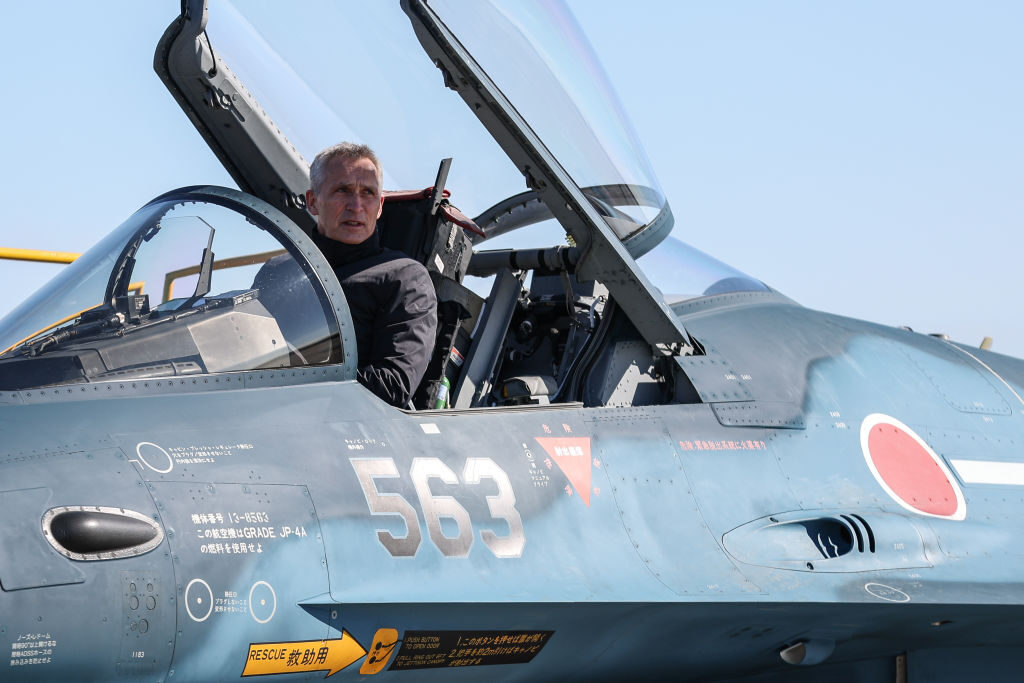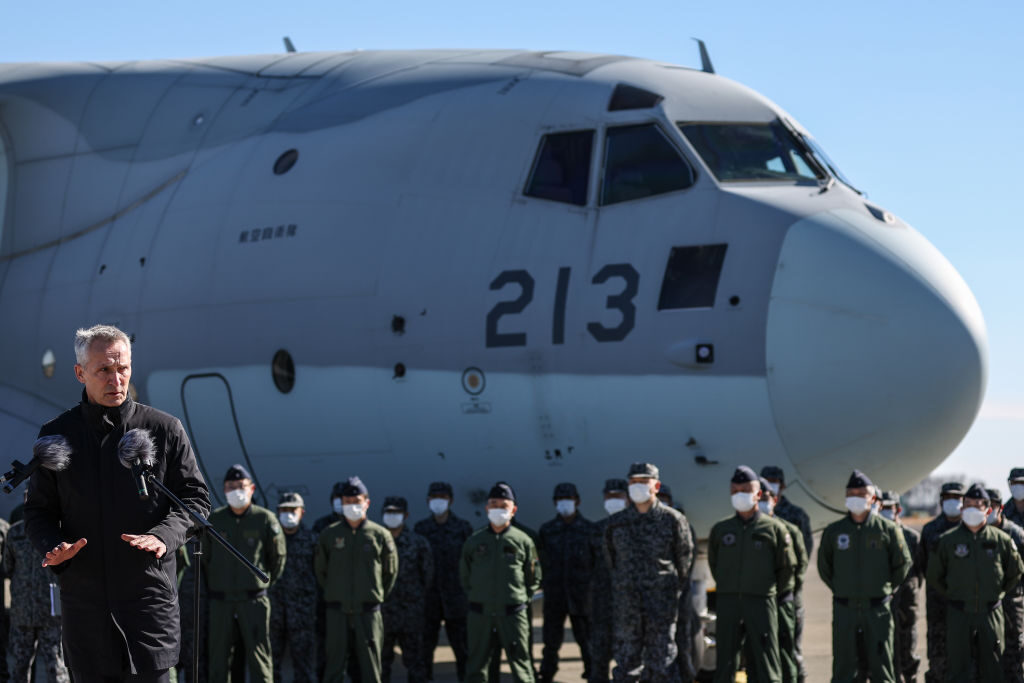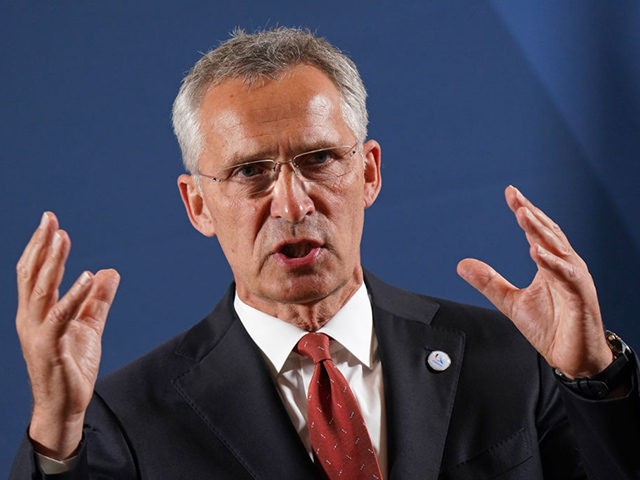The Chinese Communist Party, through its foreign ministry and state media outlets, sternly condemned NATO Secretary-General Jens Stoltenberg for seeking friendly ties with China’s neighbors, fuming in particular over a potential “devilish deal” with Japan.
Stoltenberg is currently culminating visits to Japan and South Korea, scheduled to take place from Sunday to Wednesday. While the NATO chief dedicated most of his efforts there to convincing the two countries to take on a more prominently role helping Ukraine confront the ongoing invasion of the country by Russia, Stoltenberg did address rising concerns with Chinese military belligerence and suggested that Russia’s success in Ukraine could embolden the Communist Party into further expansionism in the region.
China’s state-run Global Times newspaper compared Stoltenberg’s presence in east Asia to the medieval Crusades in a political cartoon and described NATO as an “unwelcome guest” in an editorial.
#GTCartoon: NATO's crusade. @_ValiantPanda_ pic.twitter.com/dYEOsOkeiT
— Global Times (@globaltimesnews) February 1, 2023
“Obviously, NATO is an unwelcome ‘guest’ to East Asia and the entire Asia-Pacific region. Most members here view Stoltenberg’s visit with suspicion and concern,” the Global Times proclaimed. “As two political entities with a disgraceful history of war, both ‘NATO’s Asia-Pacificization’ and ‘Japan’s militarization’ face strong moral and practical resistance. … This kind of devilish deal is bad news for the Asia-Pacific and even the whole world.
The state newspaper objected to Stoltenberg’s presence in South Korea but made clear that it was especially outraged by him daring to visit Japan.
“Although he also played up the ‘China threat’ in South Korea and tied China, Russia and North Korea together with malicious intent, his words were far less straightforward and blatant than in Tokyo,” the state newspaper claimed. “Facing the Japanese audience, Stoltenberg spent a lot of time attacking China.”
The Global Times especially condemned Stoltenberg’s concern with China potentially invading Taiwan, claiming, “it is actually NATO itself that is promoting the idea that ‘what is happening in Europe today could happen in East Asia tomorrow.'”
China routinely denies Taiwan’s sovereignty and describes its democratically-elected government as a “separatist” organization. Chinese dictator Xi Jinping warned in 2019 that anyone recognizing Taiwan’s status as a country would have their “bones ground to powder.”

NATO Secretary General Jens Stoltenberg sits in the cockpit of the Mitsubishi F-2 fighter jet during a visit at the Japan Air Self-Defense Force Iruma Air Base on January 31, 2023 in Iruma, Japan. ( Takashi Aoyama/Getty Images)
The Chinese Foreign Ministry’s official statements on Stoltenberg’s visit were less belligerent than the Global Times but nonetheless disapproving.
“The NATO Secretary General went to the ROK [South Korea] and Japan, yet he kept referring to China and hyping up the so-called ‘China threat,’ drawing ideological lines and sowing discord between countries in the region,” Foreign Ministry spokeswoman Mao Ning said on Thursday, asked to respond to Stoltenberg’s trip. “The intention behind those moves are quite alarming.”
“NATO needs to reflect on itself what kind of role it has played in European security. We have seen what NATO has done to Europe, and NATO must not seek to sow chaos here in the Asia-Pacific or elsewhere in the world,” Mao scolded.
Stoltenberg used his visit to Japan to repeatedly emphasize that he believed East Asia’s security could not be divorced from Europe.
Following their meeting, #NATO Secretary General @JensStoltenberg and the Prime Minister of #Japan 🇵 @Kishida230 issued the following statement ⤵️https://t.co/ZLwcTTBbRj pic.twitter.com/pHYwhSvd7w
— NATO (@NATO) January 31, 2023
“We see a more dangerous world with the rise of authoritarian powers like Russia, but also China (and) they are coming closer together,” Stoltenberg told the Japanese newspaper Asahi Shimbun in remarks published on Thursday. “China is becoming a more authoritarian regime and trampling on democratic rights, human rights, not only in Hong Kong, but also throughout the nation using advanced technologies to monitor their population in a way we haven’t seen before in history.”
“If (Russian) President (Vladimir) Putin wins, that will send a message to Beijing and other authoritarian regimes that when they use military force and violate international law, they can achieve their goals,” Stoltenberg predicted.
The NATO chief received a warm welcome on Wednesday from conservative Japanese Prime Minister Kishida Fumio, who agreed to several partnership projects on topics such as cybersecurity and the development of a formal office for NATO in Japan.
“I welcome the deepened interest and engagement in the Indo-Pacific region on the part of NATO,” Kishida told reporters.

NATO Secretary General Jens Stoltenberg speaks to the members of the Japan Self Defense Force at the Japan Air Self-Defense Force Iruma Air Base on January 31, 2023 in Iruma, Japan. (Takashi Aoyama/Getty Images)
While emphasizing the potential for China to become a dominant geopolitical threat, Stoltenberg repeatedly emphasized in both Japan and South Korea that NATO did not view China as an enemy, merely a concern. In remarks on Monday at the CHEY Institute for Advanced Studies in Seoul, Stoltenberg said he hoped NATO could cooperate with the Chinese Communist Party on issues such as “climate change” but nonetheless insisted, “China doesn’t share our values. China and the rulers in Beijing, they don’t believe in democracy, freedom of speech, our democratic values.”
“We don’t regard China as an adversary but of course we are concerned when we see that Russia and China are operating more together,” the NATO head said at the Seoul event. “They are training more together, patrolling together. We see naval patrols, air patrols also around Taiwan, in the Asia-Pacific.”

COMMENTS
Please let us know if you're having issues with commenting.